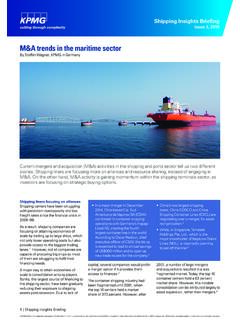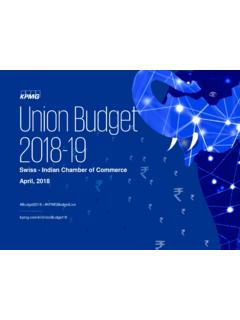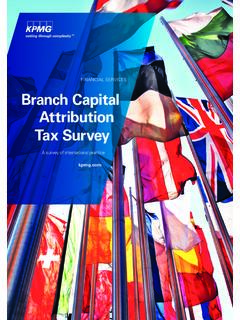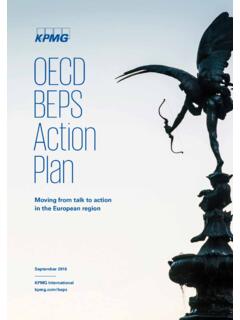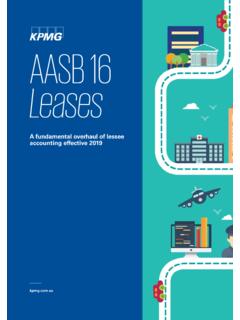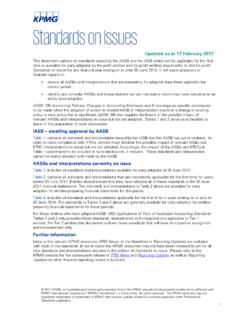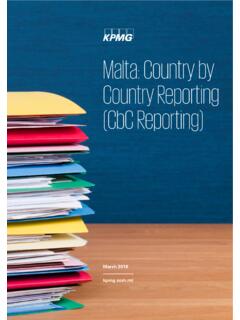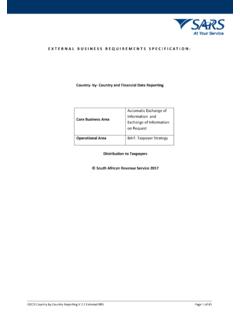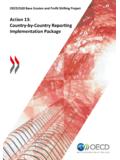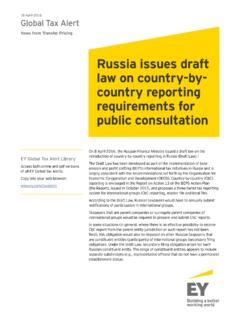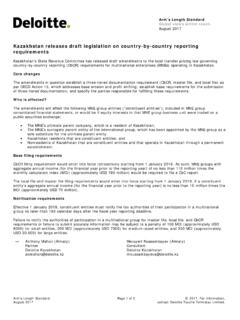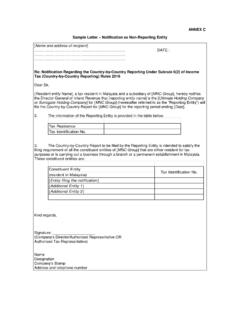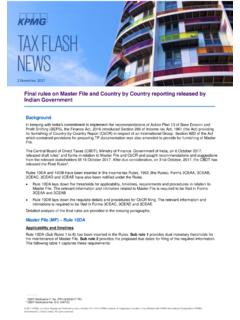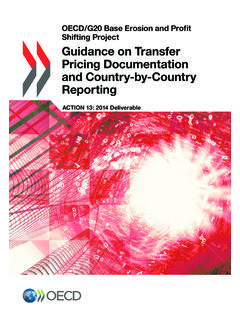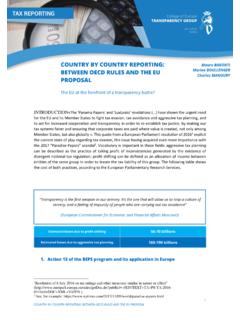Transcription of Country by Country Reporting - KPMG | US
1 Country by An overview and Tax Management Consulting Country Reporting comparison of initiatives As at October 2014 2014 KPMG International Cooperative ( KPMG International ), a Swiss entity. Member firms of the KPMG network of independent firms are affiliated with KPMG International. KPMG International provides no client services. No member firm has any authority to obligate or bind KPMG International or any other member firm vis- -vis third parties, nor does KPMG International have any such authority to obligate or bind any member firm. All rights reserved. 1 2014 KPMG International Cooperative ( KPMG International ), a Swiss entity. Member firms of the KPMG network of independent firms are affiliated with KPMG International. KPMG International provides no client services. No member firm has any authority to obligate or bind KPMG International or any other member firm vis- -vis third parties, nor does KPMG International have any such authority to obligate or bind any member firm.
2 All rights reserved. 1 Contents Introduction 2 OECD Action Plan on BEPS Action 13 3 Capital Requirements Directive IV 7 EU Accounting Directive: Chapter 10 9 Dodd Frank Act: Section 1504 10 Extractive Industries Transparency Initiative (EITI) 12 Comparison of legislative requirements 13 Comparison of data requirements 15 Timeline 16 Sources 17 2014 KPMG International Cooperative ( KPMG International ), a Swiss entity. Member firms of the KPMG network of independent firms are affiliated with KPMG International. KPMG International provides no client services. No member firm has any authority to obligate or bind KPMG International or any other member firm vis- -vis third parties, nor does KPMG International have any such authority to obligate or bind any member firm. All rights reserved.
3 2 Update Following on from the paper dated July 2014, there have been a number of updates to the requirements previously set out. Most notably the OECD released the final Country by Country Reporting (CbyC) template under the Base Erosion and Profit Shifting (BEPS) Action Plan. Background to this paper After the financial crisis, companies have been scrutinized as to whether they are paying their fair share of taxes. The debate first gained traction in the UK and has now moved to a global debate around transparency and how multi-national businesses are taxed. With the internationalization of businesses, rise of the digital economy and the challenges of the OECD Base Erosion and Profit Shifting (BEPS), companies are preparing for the new environment. The landscape is changing and providing greater transparency around tax, either to tax authorities around the world and/or to the public is something companies are now preparing for.
4 Given the rapidly changing environment it can be difficult to keep pace with the various proposals and to assess the impact that these will have on your business and to plan how you will comply. This paper sets out a high level summary of the various legislative proposals and consultations to assist you in assessing how these will affect you. To discuss any of these in more detail please get in touch with the contacts in this report or your local KPMG tax professional. Content There are now a number of frameworks both legislative and voluntary, that have been implemented or are being considered for implementation. Initially these focused on the extractives sector, but more recent proposals are expected to impact on all industries and sectors. The initiatives discussed in this paper cover: Action 13 of the OECD s BEPS (Base Erosion and Profit Shifting) Action Plan regarding Country by Country Reporting and transfer pricing documentation.
5 Capital Requirements Directive IV (CRD IV). EU Accounting Directive: Chapter 10. Dodd Frank Act: Section 1504. Extractive Industries Transparency Initiative (EITI). This paper provides a brief introduction, the Reporting requirements, current status and some of the issues to be considered. The key requirements of the legislative frameworks are summarized into a table for comparison on page 9. The paper is based on the understanding of key requirements as at July 2014 and should not be taken to be comprehensive. It will be updated periodically as the proposals develop. Challenges Country by Country Reporting was initially focused on a few select sectors, but given the requirements from the OECD, this is now a pressing issue for all multinationals. Companies will need to consider the level of resources and costs involved in gathering the data, the ease of gathering the data and potential system changes and how technology can assist.
6 The requirements for a form of assurance over the process will need to be considered. Due to the risk of the information being misinterpreted, providing an accompanying narrative and articulating the tax position, will assist in making the information as useful as possible to the reader. The tax transparency debate is constantly evolving and companies should be actively involved in shaping this debate, as well as keeping abreast of proposals and how this may impact them. Introduction 2014 KPMG International Cooperative ( KPMG International ), a Swiss entity. Member firms of the KPMG network of independent firms are affiliated with KPMG International. KPMG International provides no client services. No member firm has any authority to obligate or bind KPMG International or any other member firm vis- -vis third parties, nor does KPMG International have any such authority to obligate or bind any member firm.
7 All rights reserved. 3 OECD Action Plan on BEPS Action 13 Country by Country Reporting and Transfer Pricing Documentation Introduction On 19 July 2013 the OECD released an Action Plan on Base Erosion and Profit Shifting (BEPS). This is a significant development in respect of multilateral initiatives for modifying international tax rules. The Action Plan covers 15 specific Actions. Action 13 focuses on a company s global value chain and transfer pricing policy. It aims to introduce consistent documentation and access to information to ensure all relevant tax authorities have access to the same information about a groups value chain and the resulting tax consequences. On 30 January 2014, the OECD published a Discussion Draft on Transfer Pricing Documentation and Country by Country Reporting .
8 Following this discussion draft the OECD welcomed comments from industry and NGO s. A revised template was issued to delegates in April 2014, and a public consultation was then held in May 2014. The final template was then published on 16 September OECD will be consulting to determine the filing and sharing mechanism and is expected to announce this by February 2015. Domestic implementation into legislation is then likely to begin although there is a risk this could commence earlier. Status Action 13 is scheduled to be finalized by September 2014 for domestic implementation from January 2015. The key dates in relation to Action 13 are: 12-13 November 2013 Public consultation held. 30 January 2014 Discussion Draft published. 23 February 2014 Closing dates for comments on draft.
9 24 March 2014 Private consultation meeting. 2 April 2014 OECD webcast held. 19 May 2014 Public consultation. June/July 2014 CFA to review and approve the template September 2014 Template finalised and published. February 2015 Announcement of implementation plan. 2014 KPMG International Cooperative ( KPMG International ), a Swiss entity. Member firms of the KPMG network of independent firms are affiliated with KPMG International. KPMG International provides no client services. No member firm has any authority to obligate or bind KPMG International or any other member firm vis- -vis third parties, nor does KPMG International have any such authority to obligate or bind any member firm. All rights reserved. 4 OECD Action Plan on BEPS Action 13 Country by Country Reporting and Transfer Pricing Documentation (cont.)
10 Who s affected? The OECD Action Plan on BEPs will apply Country by Country Reporting to all companies located within an OECD or G20 Country and potentially wider. This will include all sizes of company, including Small and Medium Enterprises (SMEs). It should be noted that under the current proposals, Reporting will only be to the relevant tax authorities and will not be available to the public. Timing and submission The implementation process has not been announced but could be as early as 2015. It is proposed that the report will need to be submitted 12 months after the accounting period end of the parent. The mechanism for submission and which tax authorities the template is submitted to is not yet clear. The consultation responses show that businesses wish to submit to the tax authority in the jurisdiction of the parent company however a requirement for local filing is still a possibility although the precise mechanism for this is still to be resolved.




